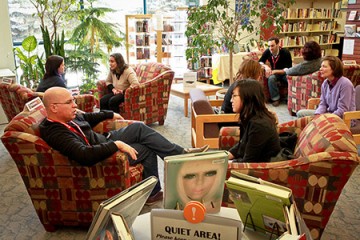Even with an advanced degree in a field such as electrical engineering or molecular biology, sometimes it makes more sense to pursue a career away from the bench or the classroom. The Hopkins Graduate Student Consulting Club formed with just that focus, steering graduate students and postdocs specifically toward the management consulting arena.
"What was traditionally called 'alternative careers,' it's not called that anymore," says Sam Hong, the club's co-president, citing a statistic that nearly 90 percent of PhDs these days end up falling into that category. "They're not going into academics, they're not going into tenure-track faculty positions"—in part because those jobs have grown too scarce for the large numbers competing for them.
Instead, many PhDs are finding that their skills can translate seamlessly to the business world, with large consulting firms such as McKinsey & Co. or the Boston Consulting Group, or in smaller boutique firms with more specialized focuses. "When you start talking to people in the business world, they want someone who can think well, who can explain themselves, who can be persuasive," Hong says—whether or not they have an MBA.
"If you can prove a hypothesis" effectively, chances are you can succeed in a consulting environment, says Hao Jia, the group's director of operations.
Now the club—which has offered business boot camps, case competitions, and interview workshops—is looking to ramp up its programming. After scoring a $10,000 Ten by Twenty grant through the Idea Lab crowdsourcing challenge this spring, Hong and Jia are organizing a monthlong series called Business Essential Lectures.
The idea, Jia says, is modeled in part after the mini-MBA programs growing in popularity at universities across the country. While not offering actual degrees, the programs can provide essential business skills in condensed timeframes to students who would otherwise be too busy to explore that path. "Students who need to work full time in a lab don't have time to study marketing and finance," says Hong.
The goal is to offer four classes starting around October, with discussions and expert speakers from the Carey Business School and the Whiting School's Center for Leadership Education, as well as industry professionals from outside the university. The program, targeted toward Hopkins postdocs and grad students in nonbusiness fields, would culminate in a mini–case competition for several teams. (The consulting club already has experience running two of those a year.)
The program will be free for participants, though a selection process might be necessary if demand is high. Hong and Jia say they intend to use the Idea Lab funds for marketing, fees and accommodations for speakers, food for the lecture series, and cash prizes for the competition winners.
The consulting club had already been exploring offering a more intensive program of lectures and workshops, but the Ten by Twenty grant cemented that idea. "We've always wanted to grow this thing," Hong says. "We thought, why don't we change the scale and expand the scope?"
Tagged business, work tools











